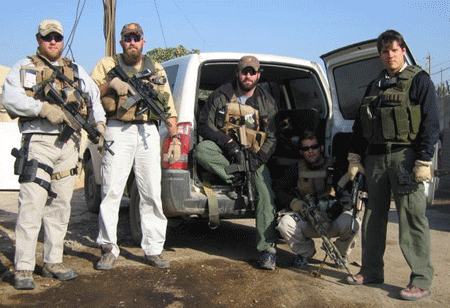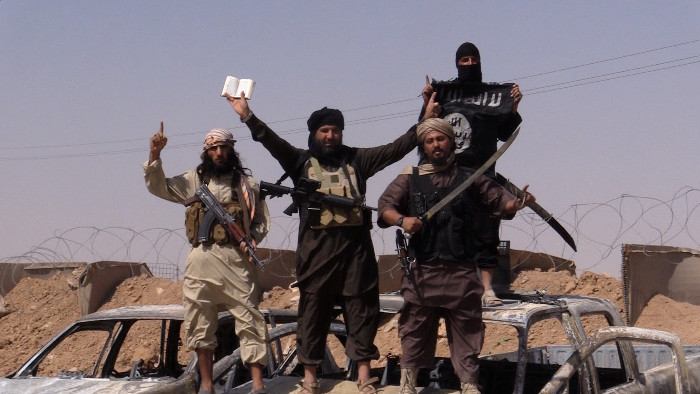Although far from a new debate, reports in March confirmed that Nigeria had been using private military companies (PMC) in its fight against Boko Haram. Initially, Nigerian President Goodluck Jonathan claimed they were “technicians” for maintenance and instruction, but soldiers battling Boko Haram admitted that mercenaries were being used both for logistical support as well as direct combat. Amidst the conflicting reports, Jonathan confirmed the use of mercenaries on March 13, 2015. It has since been reported that as many as 300 are in the fight, with most of them coming from South Africa and the now-defunct PMC Executive Outcomes (EO).
The controversy surrounding PMCs has been ongoing, reaching a climax with the 2007 Blackwater Security Consulting Nisour Square shooting in Iraq. In this incident Blackwater shot at Iraqi citizens in a Baghdad square, and although claiming they were attacked, their soldiers were eventually prosecuted for manslaughter. The affair brought criticism on the Bush administration for their reliance on PMC contractors, which by 2007 numbered at least 48,000. However, the Nigerian case is different from the American reliance on mercenaries. Since mercenary use was implemented, Nigeria has had a string of successes, recapturing Bama, Damasak, and Gwoza. While other factors are responsible for the successful campaign, among them the joint efforts of Chadian and Niger forces, it is clear that the incorporation of mercenaries has helped rather than hindered the fight against the military insurgency.
Clarification may be needed when dealing with the modern term of “mercenary”. Rather than the historical role of “soldiers for hire” usually associated with the role, the modern day usage refers to a corporation with a roster of former soldiers. The company seeks contracts for a wide variety of military roles, ranging from security guards to translators and cooks. Since these firms wish to avoid the tag of “mercenary”, the labels these companies use range from “private military company”, “private security company”, “military consultancy”, or a number of other contracting-style terms.
 Human rights groups such as the International Committee of the Red Cross have raised a variety of concerns on the existence of PMCs. As private corporations that do not neccesarially represent a state’s interest, they may have less respect for international law or “just war theory”, than a national army. . Since they are loyal only to paychecks, it is feared that PMCs only care about the end-goal, with little concern for the means they use to get there. Outside of international law, they also face condemnation for being an outsourcing of war. Additionally, PMCs can alter a country’s capabilities. Rather than have a skilled army, a state can simply purchase one, thus complicating the nation’s perceived power projection, and putting the future of conventional military forces in jeopardy.
Human rights groups such as the International Committee of the Red Cross have raised a variety of concerns on the existence of PMCs. As private corporations that do not neccesarially represent a state’s interest, they may have less respect for international law or “just war theory”, than a national army. . Since they are loyal only to paychecks, it is feared that PMCs only care about the end-goal, with little concern for the means they use to get there. Outside of international law, they also face condemnation for being an outsourcing of war. Additionally, PMCs can alter a country’s capabilities. Rather than have a skilled army, a state can simply purchase one, thus complicating the nation’s perceived power projection, and putting the future of conventional military forces in jeopardy.
Jonathan’s actions display similarities with the campaigns EO was involved with in the 1990s. Just as the use of mercenaries may have shifted the balance of power in Nigeria’s favour, EO was utilized by Angola in 1993 after Nation Union for the Total Independence of Angola (UNITA) rebels captured an oil storage area. With the Angolan army too ill-equipped to launch a counter-offensive, the government commissioned EO, and quickly recaptured the area. Similarly, in 1995, EO was hired by Sierra Leone to recapture the Komo diamond mines from rebels. While Sierra Leone was unable to regain control of the lucrative area, EO pushed the rebels back in only eleven days.
Thus, Jonathan’s actions have significant precedence in African governance, showcasing a moral dilemma for beleaguered states with poor infrastructure. Despite the aforementioned risks in using PMCs, for developing countries they may be the risk-averse course of action. Especially in a country like Nigeria, which has a long history of military rule and coup attempts, the latest occurring in 1990. North of Nigeria, President Mamadou Tandja fell to a coup d’etat in 2010, and President Blaise Compaore was overthrown last October in nearby Burkina Faso. Generals in the region are a country’s best defence, but also threaten a leader’s power. Powerful militaries can be a hazard to aspiring leaders, while PMCs are only commissioned financially and have no political interests.
Nor is the Nigerian military viewed as an effective combat force. Not only are they a potential rival for power, reports show ground troops are underpaid, corrupt, and have a high desertion rate. The criticism regarding a lack of civilian-combatant distinction applies to the Nigerian army as well. On December 4, 2014, an attack on Mundu left five civilians dead and the village burned, despite claims that no Boko Haram members were stationed there.
Given these circumstances, PMCs become viewed as a superior option in completing objectives, or even maintaining state control. While mercenaries can never address the long-term problems of Nigeria, they offer a quick solution that would be attractive to any leader hoping to maintain order and control. Although the tactic did not allow Jonathan to get re-elected, the mercenary strategy will probably continue to be employed in any country with a fractured and divisive governance.




